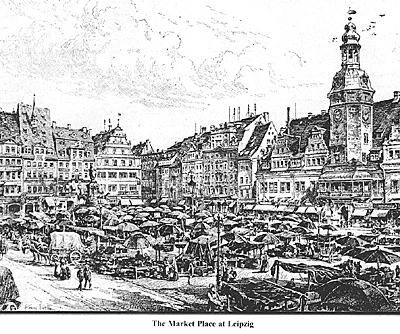The Battles Around Leipzig
October 1813
Preparations
by DH Parry
Edited by Gay Gibson
| |
Whilst, his men dwindled, and the German roads were thronged with his wounded Cuirassiers in wheelbarrows, or his troopers riding on lean cows, the allied armies, on the contrary, seemed to increase. Disaffection followed. The Saxons were deserting him en masse, Austria and Bavaria declared against him. As the enemy drew closer round him from all points, he hazarded everything on one cast of the die, chose a bad position, suffered a crushing reverse, and fled under circumstances of almost unparalleled horror.
Leipzig was at that time a small city girdled by a crumbling wall with four large and three smaller gates a wet ditch where mulberry trees grew plentifully, and was separated from
the extensive suburbs by a fine walk or boulevard planted with lindens which had grown to giant size.
It was a great centre of learning and commerce: Fichte, Goethe, and a host of famous men had studied or taught at its university. Its three annual fairs were attended by booksellers from all parts of Europe; and before Napoleon's Continental system crippled trade it had lucrative industries in gold and silver, leather, silk, wool, yarn, and Prussian blue. Had you climbed to the summit of one of its many towers, as hundreds did during the events I am about to describe, you would have seen beneath you the narrow streets of the quaint city, and farther out the public and private, for which Leipzig was justly famed, with the villas of the wealthy merchants peeping out of groves and orchards.
Far as the eye could reach stretched a gently rolling plain, wooded here and there in other places barren where the harvest had been gathered and the stubble fields were brown. The whole expanse dotted with villages innumerable, each with its pointed spire; the plain intersected by great highroads and winding byways. West of the city lay a marshy tract where the rivers Pleiss and Elster sluggishly in narrow channels, and joined the Partha, came round the northern side. This tract was a mass of tiny streams and dykes, by narrow causeway leading to Lindenau and so to the road by Weissenfels, Erfurt, and Frankfort to the Rhine.
The Battles Around Leipzig October 1813
|
 The well worn old simile of the Phoenix rising from her ashes may be applied with truth to the French army on its return from Moscow; for, before its wounds were healed, almost before its actual losses could be counted, another mighty force was called into existence and Napoleon, once more humming “Malbrook s'en va-t-en guerre,” set forth from Paris to lead it to fresh glories and terrible defeat. Lützen, Wurschen Bautzen, Dresden, were victories dearly won at the expense of enormous slaughter; but Kulm, Katzbach, and Gross Beeren came as heavy blows, and Napoleon’s projects seemed threatened with tragic failure.
The well worn old simile of the Phoenix rising from her ashes may be applied with truth to the French army on its return from Moscow; for, before its wounds were healed, almost before its actual losses could be counted, another mighty force was called into existence and Napoleon, once more humming “Malbrook s'en va-t-en guerre,” set forth from Paris to lead it to fresh glories and terrible defeat. Lützen, Wurschen Bautzen, Dresden, were victories dearly won at the expense of enormous slaughter; but Kulm, Katzbach, and Gross Beeren came as heavy blows, and Napoleon’s projects seemed threatened with tragic failure.